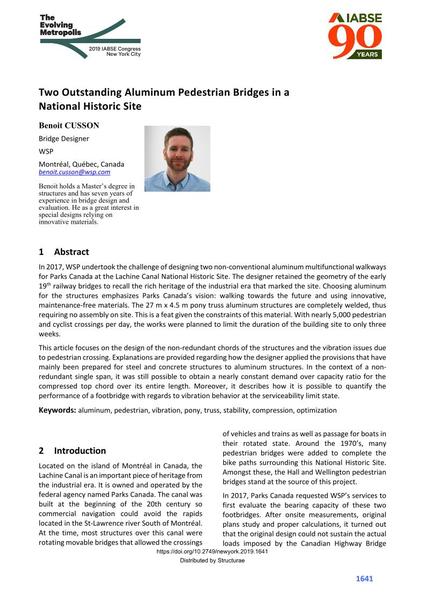Two Outstanding Aluminum Pedestrian Bridges in a National Historic Site

|
|
|||||||||||
Détails bibliographiques
| Auteur(s): |
Benoit Cusson
(WSP)
|
||||
|---|---|---|---|---|---|
| Médium: | papier de conférence | ||||
| Langue(s): | anglais | ||||
| Conférence: | IABSE Congress: The Evolving Metropolis, New York, NY, USA, 4-6 September 2019 | ||||
| Publié dans: | The Evolving Metropolis | ||||
|
|||||
| Page(s): | 1641-1646 | ||||
| Nombre total de pages (du PDF): | 6 | ||||
| DOI: | 10.2749/newyork.2019.1641 | ||||
| Abstrait: |
In 2017, WSP undertook the challenge of designing two non-conventional aluminum multifunctional walkways for Parks Canada at the Lachine Canal National Historic Site. The designer retained the geometry of the early 19thrailway bridges to recall the rich heritage of the industrial era that marked the site. Choosing aluminum for the structures emphasizes Parks Canada’s vision: walking towards the future and using innovative, maintenance-free materials. The 27 m x 4.5 m pony truss aluminum structures are completely welded, thus requiring no assembly on site. This is a feat given the constraints of this material. With nearly 5,000 pedestrian and cyclist crossings per day, the works were planned to limit the duration of the building site to only three weeks. This article focuses on the design of the non-redundant chords of the structures and the vibration issues due to pedestrian crossing. Explanations are provided regarding how the designer applied the provisions that have mainly been prepared for steel and concrete structures to aluminum structures. In the context of a non- redundant single span, it was still possible to obtain a nearly constant demand over capacity ratio for the compressed top chord over its entire length. Moreover, it describes how it is possible to quantify the performance of a footbridge with regards to vibration behavior at the serviceability limit state. |
||||
| Mots-clé: |
stabilité aluminium
|
||||


